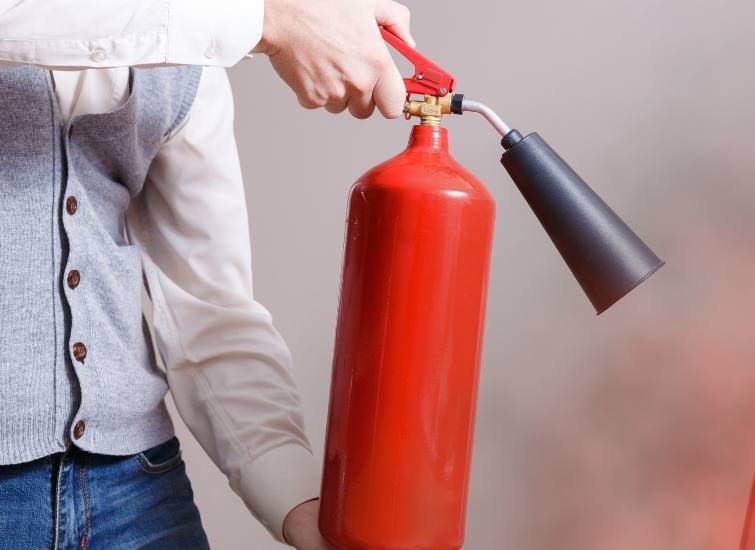Confined spaces pose unique challenges when it comes to fire safety, and choosing the right fire extinguisher is crucial in ensuring the safety of individuals within such environments. One type of fire extinguisher that should be avoided in confined spaces is the water-based fire extinguisher. While water extinguishers are effective for certain types of fires, they can be hazardous in confined spaces due to various factors.
Why Shouldn’t Water-Based Fire Extinguishers Be Used in Confined Spaces?
Water-based fire extinguishers are not suitable for confined spaces primarily because of the risk of electrical hazards. When confronted with fires involving electrical equipment or wiring, water can conduct electricity and pose a serious danger to individuals attempting to extinguish the flames. In confined spaces where the risk of electrical fires is higher, it’s essential to opt for alternative fire extinguisher types.
The Importance of Choosing the Right Fire Extinguisher for Confined Spaces
Confined spaces, such as storage rooms, crawl spaces, or utility closets, present specific challenges for fire safety. Limited ventilation and restricted access can complicate firefighting efforts, making it imperative to select the most appropriate fire extinguisher for these scenarios. Using the wrong type of extinguisher not only jeopardizes the safety of those in the confined space but can also exacerbate the fire or cause additional hazards.
Understanding Water-Based Fire Extinguishers
Water-based fire extinguishers are typically effective against Class A fires, which involve ordinary combustibles like wood, paper, and cloth. However, they are not designed to handle Class B (flammable liquids) or Class C (electrical) fires. In confined spaces where these classes of fires are more likely, using a water-based extinguisher can lead to disastrous consequences.
Alternative Fire Extinguisher Options for Confined Spaces
For confined spaces, it is recommended to use dry chemical fire extinguishers or CO2 fire extinguishers. Dry chemical extinguishers are versatile and effective against Class A, B, and C fires, making them suitable for a variety of confined space scenarios. CO2 extinguishers, on the other hand, are ideal for electrical fires as they leave no residue and do not conduct electricity.
Consideration of Environmental Factors
In addition to the type of fire, environmental factors must be taken into account when selecting a fire extinguisher for confined spaces. For instance, if the confined space is filled with sensitive electronic equipment, a clean agent fire extinguisher may be the best choice to avoid damaging the devices while extinguishing the fire.
Backlinks for Further Information
For more in-depth insights into fire safety and confined spaces, refer to reputable sources such as the National Fire Protection Association (NFPA) and the Occupational Safety and Health Administration (OSHA). These organizations provide comprehensive guidelines and standards to ensure the highest level of safety in various environments.
Remember
Choosing the right fire extinguisher for confined spaces is a critical aspect of ensuring the safety of individuals and preventing the escalation of fires. Avoiding water-based fire extinguishers in these environments, especially when dealing with electrical or flammable liquid fires, is essential. By understanding the specific risks associated with confined spaces and selecting the appropriate fire extinguisher type, individuals can enhance their ability to respond effectively to emergencies.
Variations of the Question with Answers
What Types of Fire Extinguishers Should Be Avoided in Confined Spaces?
Water-based fire extinguishers should be avoided in confined spaces, particularly due to the risk of electrical hazards. Opt for alternatives like dry chemical or CO2 extinguishers for enhanced safety.
Are Water-Based Fire Extinguishers Safe in Confined Spaces?
No, water-based fire extinguishers are not safe in confined spaces, especially when dealing with electrical fires. Using them can pose serious risks due to the conductivity of water.
Which Fire Extinguisher Is Suitable for Confined Spaces?
Dry chemical fire extinguishers or CO2 fire extinguishers are recommended for confined spaces, offering versatility and effectiveness against various types of fires without introducing additional hazards.
Can Water Extinguishers Be Used in Tight Spaces?
Water extinguishers are not suitable for confined spaces, as they pose electrical hazards. It’s crucial to choose extinguishers tailored to the specific fire risks in tight spaces, such as dry chemical or CO2 extinguishers.
What Are the Risks of Using Water-Based Fire Extinguishers in Confined Spaces?
The primary risk of using water-based fire extinguishers in confined spaces is the potential for electrical hazards. This can result in injuries or worsen the fire situation. Opting for alternative extinguishers is essential for mitigating these risks.


